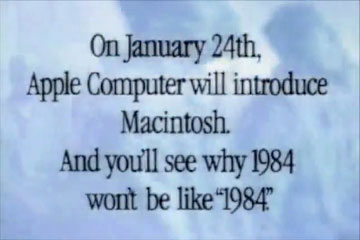The question of color takes up much space in these pages, but the question of color, especially in this country, operates to hide the graver questions of self. – 1961, James Baldwin, expatriated Black-American writer and gay activist
Blood, darky, Tar Baby, Kaffir, shine, moor, blackamoor, Jim Crow, spook, quadroon, meriney, red bone, high yellow, Mammy, porch monkey, home, homeboy, George, spear chucker, schwarze, Leroy, Smokey, mouli, buck, Ethiopian, brother, sistah. – 6/13/1989, Trey Ellis, “Remember My Name,” Village Voice
Macintrash, Crapple, Jobs’s Folly, “toy computer” – Some of the derogatory names ascribed to the Mac
Over the last few years, I’ve often drawn analogies between the worldwide collective known as Mac users and that group of dark-hued Americans known as “blacks.” I’ve also drawn comparisons between religious movements and the Mac-using community.
At various and sundry times, I’ve written (but have never published) additional scribblings comparing the Mac community to gay people, to short people, to ugly people, to pretty people, to oppressed people, to moneyed people, and to nearly every other subdivision of humanity I could imagine while under the guidance of a beer-induced Muse. But I always come back to the race analogy, because the comparisons are closer to home. My home, anyway.
Since 1992 – the year I went back to college and assiduously pursued understanding of other perspectives – I’ve spent considerable portions of my time pondering the role, influence, and meaning of race in American society. Is it necessary? Is it just? And, most importantly, is it – or anything else, for that mater – a valid means of demarcating groups of people and segments of society?
These questions, especially the last one, have important parallels – and ultimately, major ramifications – on the future of the Mac platform as it relates to the larger world of personal computing. How we see ourselves is just important as how others see us – the former influences and shapes the latter. For the moment, though, let’s ignore how others perceive us.
It’s a Mac thing; “they” won’t understand it. At least that’s the attitude that permeated the world of Mac in times past. No one can appreciate and understand the Mac platform, we once thought, without totally giving themselves over to things Macintosh – this meant adoring the Mac religiously, never finding fault with the OS or the hardware upon which it ran.
Things change. For example, let’s assume you are a Mac user through and through. You’ve never touched a PC. Then you get a job with a company that is all-PC. You dread having to deal with Windows. But over time, if you have an open mind, you realize that there are actually things that Microsoft did right with Windows. Which things I’ll leave up to you to discover, ponder, and discuss. The main point is that you begin to see that the Mac has limitations and there are things in other OSes that Apple could stand to emulate.
I see this and appreciate this due to my lifelong journey towards greater self-realization and more understanding about race and other forms of difference. For example, I lived many of my younger years as an “afrocentric.” I believed that black was where it’s at, to put it into a more youthful parlance. Today, however, I am more of a culturally eclectic American, as we all should be. This journey and concomitant discoveries have encouraged me to seek growth in other areas – namely, for discussion purposes, how I view what Apple is doing to evolve its product line, its corporate image, and the relationship of the Mac platform to the greater world of personal computing. Indulge me and allow me to continue “talking black” for a second to flesh out my point.
Throughout the history of America, black men and women have arisen from the rank and file who have publicly pondered the relationship between the darker-and lighter-hued segments of American society. In my readings, I’ve noticed two diametrically opposed schools of thought that is probably paralleled in other minority communities: the segregationist philosophy and the integrationist philosophy.
The black Segregationist argument is that blacks don’t need whites. We should, they argue, work towards gaining a “separate, but equal” society: our own banks, schools, and governments, as well as our own financial and social infrastructures. The Integrationist begs to differ, arguing for black assimilation into the American mainstream, instead of being an isolated black tributary. After all, it is America, they argue, e pluribus unum and all of that.
Both are similarly wrongheaded, in my opinion, in that they both begin arguing from an us-verus-them premise.
 Can’t we all just get along? The Mac community has had this same wrongheaded spirit over time, and it’s high time we jettisoned that mindset. It’s a different today than it was when Ridley Scott showed the world why 1984 won’t be like ‘1984’. Apple lost the OS war, and the world has standardized on things that the Mac shunned in the past: TCP and SMB, to name a couple.
Can’t we all just get along? The Mac community has had this same wrongheaded spirit over time, and it’s high time we jettisoned that mindset. It’s a different today than it was when Ridley Scott showed the world why 1984 won’t be like ‘1984’. Apple lost the OS war, and the world has standardized on things that the Mac shunned in the past: TCP and SMB, to name a couple.
If you are watching, Apple has been moving the Mac more towards mainstream standards for some time – and rightly so. This isn’t the first time I’ve talked about this. Repetition is a great form of emphasis, I’m told. So, I’m intentionally repeating myself here.
Just as I believe that nonwhite communities in America will need to gravitate towards the cultural and social commonalities that unite us and make life easier for all – while maintaining each group’s respective cultural distinctives, if they so choose – so will the Mac continue to incorporate those features that will make it the “first-class citizen” that Steve Jobs alluded to in his recent Macworld keynote, all while maintaining that distinctiveness that makes a Mac, well, a Mac
This is one reason why I have no problem with the new Aqua GUI in Mac OS X. I see the good in the change, as it has incorporated features that have existed in other OSes and lend themselves well to the Mac world.
Black American cultural and literary critic Houston Baker once commented that “blackness” is a nothing but a trope (metaphor), implying that we need to get beyond the few phenotypical and genotypical distinguishing characteristics. Those things never change, so why harp on them? Hence, we will always be black (or whatever your cultural heritage may be). The same can be true for the Mac. There will be many characteristics that will always make a Mac “different” in others’ eyes. Therefore, there is nothing wrong with evolving the Mac to make it better, even if that means incorporating “PC” features. Ditto for any “group growth” in nonwhite communities.
In order to avoid the risk of forcing this black-and-Mac analogy to break down, I want to end it right here. But I do want you to consider the changes I’ve attempted to describe, the changes that are happening to the Mac as we know it.
Some things have to change. Some do not. But no matter what is changed, the Mac will always be the Mac, as long as it is the alternative computing option. There is nothing Apple can do to change that.
Keywords: #raceasmetaphor
Short link: http://goo.gl/zyOyCv
searchword: raceisametaphor


